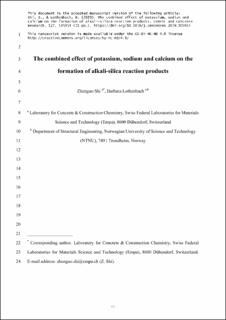The combined effect of potassium, sodium and calcium on the formation of alkali-silica reaction products
Peer reviewed, Journal article
Accepted version

Åpne
Permanent lenke
https://hdl.handle.net/11250/2825567Utgivelsesdato
2020Metadata
Vis full innførselSamlinger
Sammendrag
Both alkalis and calcium play essential roles in the formation of alkali-silica reaction (ASR) products. Investigation of their combined effect helps to better understand the conditions of ASR. In this study, samples with a constant Ca/Si ratio of 0.3 but different K(or Na)/Si and K/Na ratios have been synthesized at 80 °C. Experimental studies and thermodynamic modelling show that a sufficient amount of K or Na is essential to initiate ASR; at low alkali concentrations C-S-H is stabilized instead. However, too high alkaline concentrations (≥900 mM at K(or Na)/Si ≥ 1) also favor C-S-H formation and suppress ASR product formation. The results reveal a strong effect of the alkalis (K and/or Na) on calcium concentrations and on the formation of ASR products; a maximum ASR product formation is observed at Na or K concentrations between 200 and 500 mM and at initial Ca/Si ratio between 0.1 and 0.4.
